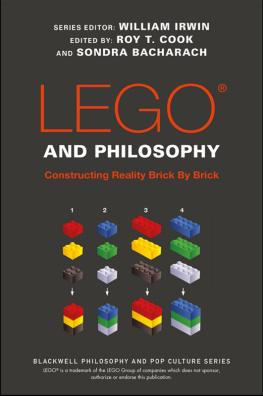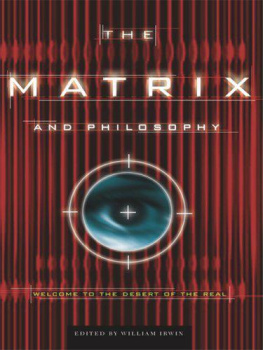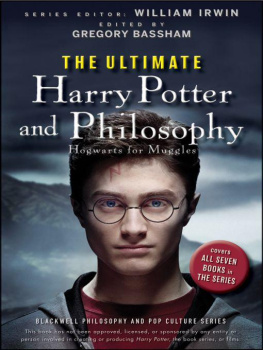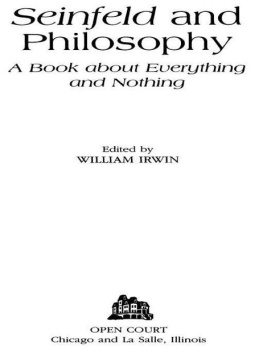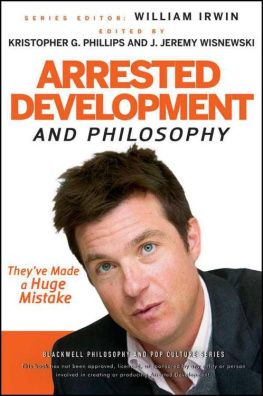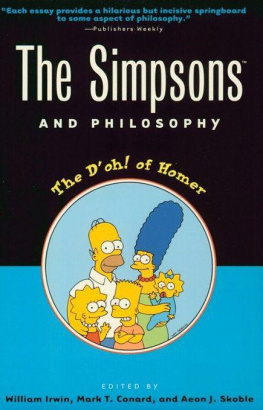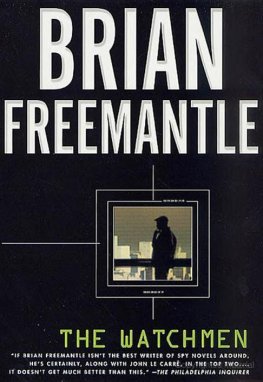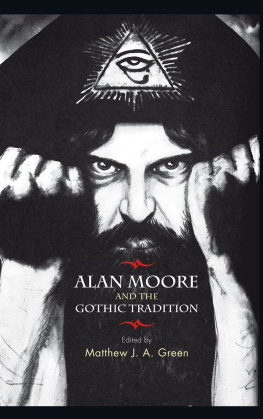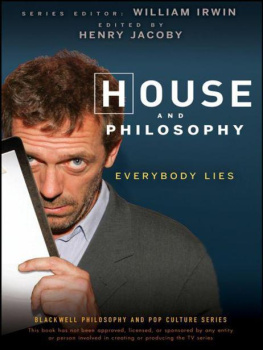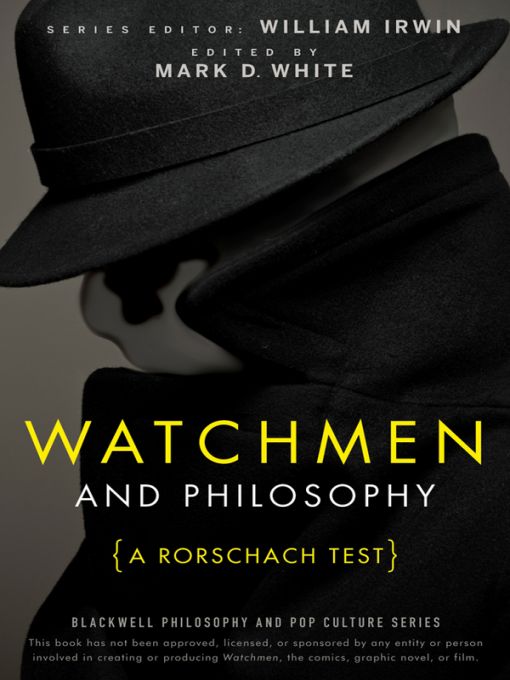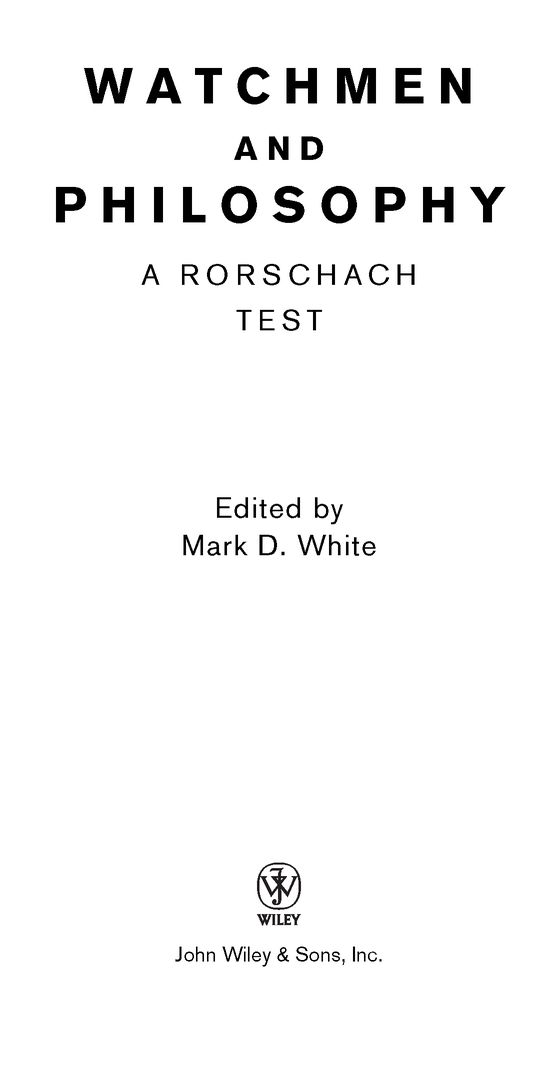Table of Contents
The Blackwell Philosophy and Pop Culture Series
Series Editor: William Irwin
South Park and Philosophy
Edited by Robert Arp
Metallica and Philosophy
Edited by William Irwin
Family Guy and Philosophy
Edited by J. Jeremy Wisnewski
The Daily Show and Philosophy
Edited by Jason Holt
Lost and Philosophy
Edited by Sharon Kaye
24 and Philosophy
Edited by Richard Davis, Jennifer Hart Week, and Ronald Weed
Battlestar Galactica and Philosophy
Edited by Jason T. Eberl
The Office and Philosophy
Edited by J. Jeremy Wisnewski
Batman and Philosophy
Edited by Mark D. White and Robert Arp
House and Philosophy
Edited by Henry Jacoby
X-Men and Philosophy
Edited by Rebecca Housel and Jeremy Wisnewski
ACKNOWLEDGMENTS
They Left It Entirely in My Hands
I would like to thank Bill Irwin for his ongoing stewardship on this series; he is as closely involved with every book as a series editor can be, and every book carries his indelible stamp. I thank Eric Nelson and Connie Santisteban at Wiley, not only for their continued editorial and promotional support, but also for their love of Watchmen and their undying support of this book. My most emphatic thanks go to the contributors, who brought their unique perspectives on Watchmen to this book.
Finally, on behalf of everyone involved with this book, I thank Alan Moore and Dave Gibbons, without whom the world of comics, literature, and popular culture would be sorely lacking.
INTRODUCTION
A Rorschach Test
When I picked up the first issue of Watchmen from my comic book store in 1986, I had no idea what I was holding in my hands. (After all, I probably picked up the latest Booster Gold in the same trip!) But a few pages in, I had a feeling that something was different, and by the end of the final issue, I knew that comics had changed forever.
In Watchmen, Alan Moore and Dave Gibbons gave us a glimpse of what a world with costumed heroes might actually look likeand it wasnt pretty. This was not the shiny world of tomorrow that was so familiar from the Superman comics. The world of Watchmen surpassed even the grim and gritty Gotham City and Hells Kitchen of Frank Millers Batman and Daredevil stories. These were not your noble, perfect, shiny heroes, eitherNite Owl could be your Uncle Al, and Rorschach could be the crazy guy down the street who talks to pigeons (and thinks they talk back). Even Dr. Manhattan doesnt seem to know what to do with his nearly limitless power. And the Comedian, a man with no superpowers who is allowed to run amok with the sanction of a very corrupt state, may possibly be the most frighteningand realisticaspect of Watchmen.
Although I can usually find something philosophical to say about any comic (even Booster Gold), Watchmen is an embarrassment of riches to the comics-obsessed philosopher. The longer you stare at it, the more possibilities you see. From the unique metaphysical nature of Dr. Manhattan to the extreme ethical positions of Ozymandias and Rorschach to Nite Owls paunch and Silk Spectres heels, Moore and Gibbons created the richest work of comic fiction the world had ever seen, and which continues to fascinate readers today.
In this book, philosophers delve into these issues and more. How does Dr. Manhattan perceive time? How can we justify Ozymandiass grand plan, and should Rorschach have threatened to expose it? What do the two Silk Spectres, mother and daughter, say about the status of women and the state of feminism? How do we feel about the governments involvement with the Comedian and Dr. Manhattan? And is there anything gooddare we say virtuousabout Nite Owls less-than-ripped torso?
Watchmen and Philosophy is a tribute to Moore and Gibbonss masterpiece, not so much adding to its philosophical depth as highlighting it. Whether you followed Watchmen one month at a time in the 1980s (and countless times since) or just discovered the graphic novel last week and cant put it down, you know how engaging and disturbing the story is. So, after you read this book, read Watchmen againif you see something in it you didnt see before (yet was always there), then weve done our job. (Hurm.)
PART ONE
THE POLITICS OF POWER: WHO WATCHES THE WATCHMEN?
ONE
THE SUPERMAN EXISTS, AND HES AMERICAN: MORALITY IN THE FACE OF ABSOLUTE POWER
Christopher Robichaud
The Son of a Watchmaker
Weve all heard the Spider-Man saying With great power comes great responsibility. But what kind of responsibility comes with absolute power? In the world of Watchmen, a freak accident turns physicist Jonathan Osterman into Dr. Manhattan, a kind of superman who is able to perceive events atemporally, live indefinitely, manipulate matter at its most basic level, and travel unaided to distant worlds. In short, theres very little Dr. Manhattan wants to do that he cant do. And this puts him in a rather unique position. Dr. Manhattan doesnt just have great power, he has a whole different magnitude of power, a kind of hyper-power that makes him, in the estimation of the esteemed Professor Milton Glass, more or less a god on Earth. Gods American, tooand thats not a trivial fact. Dr. Manhattans status as a U.S. asset gives the America of Watchmen an even greater technological and military advantage than it has in actuality.
But the existence of such a superpowerful and superintelligent being who lives among mere mortalsat least for a timeinvites us to consider several questions that fall within the purview of moral philosophy. Is Dr. Manhattan any longer capable of reasoning about right and wrong in the way that he did as Jonathan Osterman? What force does morality really have over someone as powerful as him? And how ought the United States itself behave, given the supreme international dominance it has in virtue of Dr. Manhattans existence?
Rubble and the Human Race
Lets begin by looking more closely at Dr. Manhattans thoughts and actions. A little way into Watchmen, he leaves Earth to reside on Mars. His departure is spurred by public accusations that his presence causes those close to him to develop cancer. (This turns out to be false; the rumor was spread by Ozymandias as part of his plan to eliminate, one way or the other, the heroes who would stand in the way of his grand scheme.) But Dr. Manhattan had withdrawn emotionally from the world long before his physical departure, as his partner Laurie Juspeczyk, the second Silk Spectre, would readily acknowledge. As a result, Dr. Manhattan no longer finds much value in the human race; in particular, he finds it difficult to care about the pressing problem immediately confronting it, that of possibly having to endure a nuclear war, the threat of which is, in part, due to his decision to take up residency on Mars.
What exactly is going on with Dr. Manhattan? Weve just made three important claims. The first is that hes having difficulty finding human beings morally valuable. The second is that hes somehow emotionally absent. And the third is that this absence is the cause of his, let us say, moral ambivalence. Can we defend these assertions?


